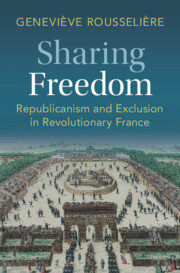‘An excellent piece of scholarship that breaks new ground in several areas of importance for political theory and intellectual history. Rousselière shows that French republicanism in the Revolutionary period had many faces, but that running through them all was an ideal of ‘sharing freedom’ which contained paradoxes that continue to plague French politics and society today, from the problem of the banlieues to conflicts around the principle of laïcité. A vital resource for scholars of republicanism, of freedom, of the French Revolution, of Rousseau, and of contemporary French politics, among other things.’
Sharon R. Krause - William R. Kenan, Jr. University Professor of Political Science, Brown University
‘Republicanism began as a theory of freedom for an educated, virtuous social elite. During the French Revolution, republican writers tried to democratize the theory in various ways. Rousselière explores key moments in the history of these efforts with subtlety and insight, and shows that they were only partly successful. Her book offers a strikingly new account of the republican tradition and helps to explain why it continues to grapple with the question of exclusion.’
Bryan Garsten - Professor of Political Science and Humanities, Yale University
‘… a significant addition to the intellectual history of republicanism and deserves a wider audience among revolutionary-era scholars. … Highly recommended.’
J. Rogers
Source: CHOICE
‘… excellent … What is original about Rousselière’s account is that she takes seriously Rousseau’s contribution to the possibility of large-scale republicanism …’
Sandrine Bergès
Source: The Review of Politics
‘Rousselière ably demonstrates important trends in the Enlightenment era’s understandings of liberty and of political inclusion and exclusion, and she is effective in showing how revolutionaries sought to universalize ‘freedom on the basis of a tradition that had not been meant for that purpose’.’
Micah Alpaugh
Source: H-France Review


